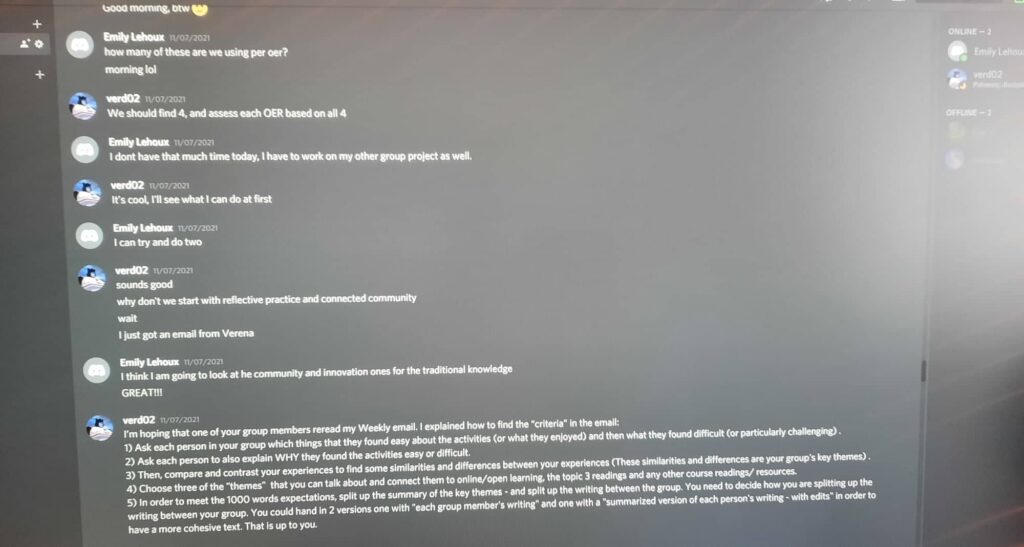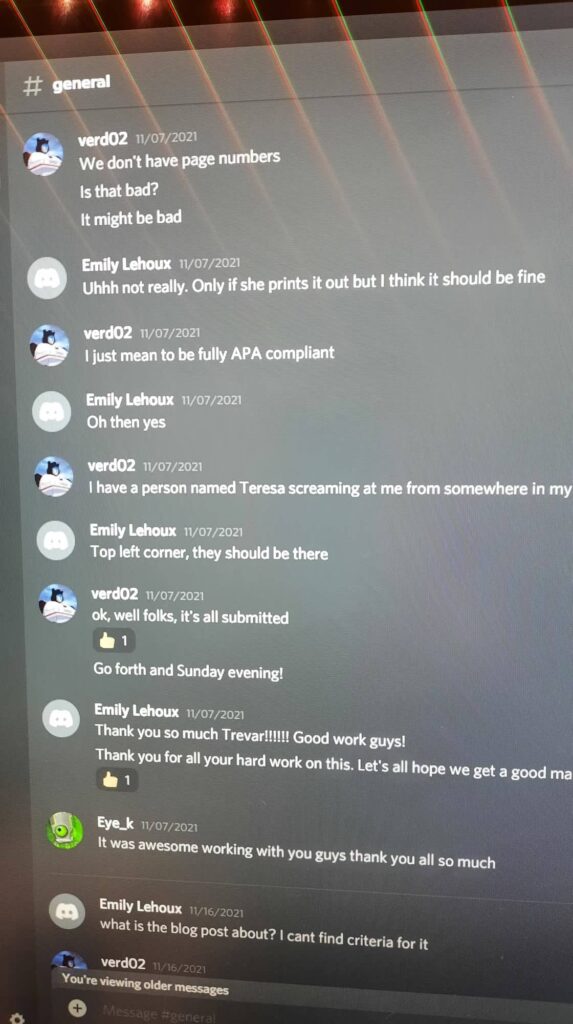OpEd Article:
Everybody is familiar with blogging. Blogging is one of the most popular online tools for open online education. Open and online education has evolved over the past ten years and the trend of blogging has relatively stayed the same maybe except for being more popular. According to the Weller article, blogging became popular in 2003 where people would journal, keep diaries, and subscribe to other people’s blogs via feeds such as RSS. (2018. para. 2 – 3). There has been no other trend that has continued to be so popular and so strong, Weller himself also states that some things might be better in the blog version concluding, that blogging will always be one of the strongest Ed-tech trends created (Para. 3). Not only are blogs a simple tool for online education, but it is also open to inclusivity to all diverse learners. This section of the eportfolio will not only argue that blogs are the easiest and most effective way to document your learning in open education, but it will also serve as a general reflection to the course and provide personal insight on other topics to guide open education and the use of blogging as documentation.
According to Nova Southeastern University, “blogs can be used as a group discussion, peer review and collaborated project. Blogging about a subject is more engaging than simply reading” (2019. Para 1). On their website, they provide some points of benefits to blogging for students. These points include the promoting of self-expression, development of analytical thinking, exercising the students’ creativity, improving students writing skills, and encouraging the sharing of resources among students and teachers (NSU. 2019). It is always important to have some guidelines set by the instructor for blogging, as it makes it easier for students to be responsible about their own learning. Keeping on the same topic, no spam or replies in the comments that are off-topic, online etiquette, respect for others, and offer feedback, reflections, and other suggestions or questions to other peers’ blogs are some guidelines that are provided by the NSU website (NSU. 2019).
This new era of open online education has evolved significantly to where it is creating a more inclusive and accessible learning environment for not only learners with needs but all learners. I think it is important to reflect on topic 4 of the course, as it is one of the most vital aspects of open and online education. The accessibility of online education should have already been applied to regular face-to-face education in schools, but as education continues to evolve, I am happy to see that learning accessibility is one of the main points that has come out of this new era of online education. Using the course reading “inclusive learning design handbook” by the flow project, “learning outcome research shows that learners learn best when the learning experience is personalized to the learning needs” (Introduction. Para. 7). We discussed and examined OER’s in our group project in the course and concluded from the assignment cars also provide easy accessibility for learners with specific disabilities or needs. OER has more of an advantage to be accessible because they are born digital making them more flexible and adaptable in assisting and addressing the diversity of learning needs (Floe Project. Perspectives: Achieving Inclusive Education page. Para 4).
Looking back at my assignment blog post #1, after going through the rest of the course, I have come to an understanding that connecting to peers and the theory of connectivism has more clarity and is an easier tool to frame education around. My experience in the IED courses with open instruction and directed facilitation instead of direct teaching forces a more engaging and welcoming group discussion which opens for more personal reflections on the material.
Lastly, I obviously had to use the article summary that we did in week 11 of the course to back up my argument. I had chosen chapter 27, “What Education Taught Me” by Jamie Marsh in the Bali, B. et. Al. article, “Open at the Margins”. Marsh created this blog post as a guide for people who do not fully understand or use blogging as a form of learning documentation. some background in March, she is a marine biology student who was on a 16-week tropical marine biology trip and this blog post is a reflection and a guide regarding that. The main points that she covers are, keep an open mind, take control of your education, professors are still learning with you, collaborate with your peers, trust the system, be proud and confident in your work, and finally, put your work out there and make connections. A couple of specific points that I take away from this chapter is that “education is not a single, one-way, narrow, dead-end street…be open to new methods” (Marsh. 2020. Para 3); “Don’t take your education for granted, don’t let an individual, whether a peer or a professional, have more control over your education than you do” (Para. 4); “no teacher that is teaching with open pedagogy, is teaching the way you were taught. They are learning with you” (para. 5); “Take advantage, the system works, I can’t even begin to tell you how much I learned and will continue to learn outside the classroom” (para. 7); and lastly, “Despite how awkward or weird he may feel for putting yourself out there, ask people to read your post, see what they think about it…take advantage!” (Para. 9). I personally think is one of the most important guides for people who are wanting to learn how to blog especially for an open course online.
If you can only take away one thing from this OpEd, I highly recommend you used the guidelines set by Marsh. I 100% agree with everything that she has said in the article, and I think that the points that she has made will help you create your own blog and document your own learning journey. I can see how closed off I was at the start of the course. I can also see the huge benefit of blogging as it creates a more comfortable and safe space to put down your own opinions and your newly learned knowledge. I think it’s a great and easy way for all people to access what you have learned, what is important to you, and what others can take away from the experience of your personal research. I think blogging is the easiest and most entertaining way to document your learning because it is one of the most engaging and interactive ways to connect with peers and other people. Blogging has been around for almost 20 years at least and it is one of the only trends that have continued to stay so popular that people like Weller want other online options to have a blog version. Some reflection questions to think of for the future of blogging, how can blogging improve to make it more inclusive for all diverse learners? what is next for blogging in the future? what is the specific reason you’re blogging for? what can people benefit or take away from your blog? Why did you choose to blog to document your learning and knowledge? Something that I have come to understand about blogging is that nobody is invalid, their words and their knowledge are what they have come to know, and you can choose for yourself if you want to engage, connect, or even use what they have contributed to the specific topic.
Word Count: 1252
References:
Floe Project. (Accessed on November 30, 2021). Inclusive Learning Design Handbook. Floe Project. Retrieved from: https://handbook.floeproject.org
Lehoux, Emily. (2021). “EDCI 339 Assignment Blog Post #1: The Good, The Bad and The Not So Sure About Online Learning”. Word Press/Opened. Retrieved from: https://indigenousstudieseducation.opened.ca/2021/09/26/edci-339-assignment-blog-post-1-the-good-the-bad-and-the-not-so-sure-about-online-learning/
Marsh, Jamie. (2020) Chapter 27. “What Education Taught Me” in Bali, B., Cronin, C., Czerniewicz, L., DeRosa, R. & Jhangiani, R. “Open at the Margins”. Rebus Community Pressbooks. Retrieved from: https://press.rebus.community/openatthemargins/
Nova Southeastern University. (2019) “Benefits of Blogging In Education”. Learning and Education Centre. NSU Florida. Accessed on: November 30th, 2021. Retrieved from: https://www.nova.edu/lec/This-Week-in-the-LEC/2019/August/Benefits%20of%20Blogging%20in%20Education.html
Weller, M. (2018, August). Twenty years of EdTech. EDUCAUSE Review, 53(4). Retrieved from https://upload.wikimedia.org/wikipedia/commons/c/ca/Ed_Tech_Hegarty_2015_article_attributes_of_open_pedagogy.pdf
Blog Posts:
Evidence of V&R Map, Wikipedia Edit, Twitter Chat participation & Group Participation:
Visitor & Resident Map:
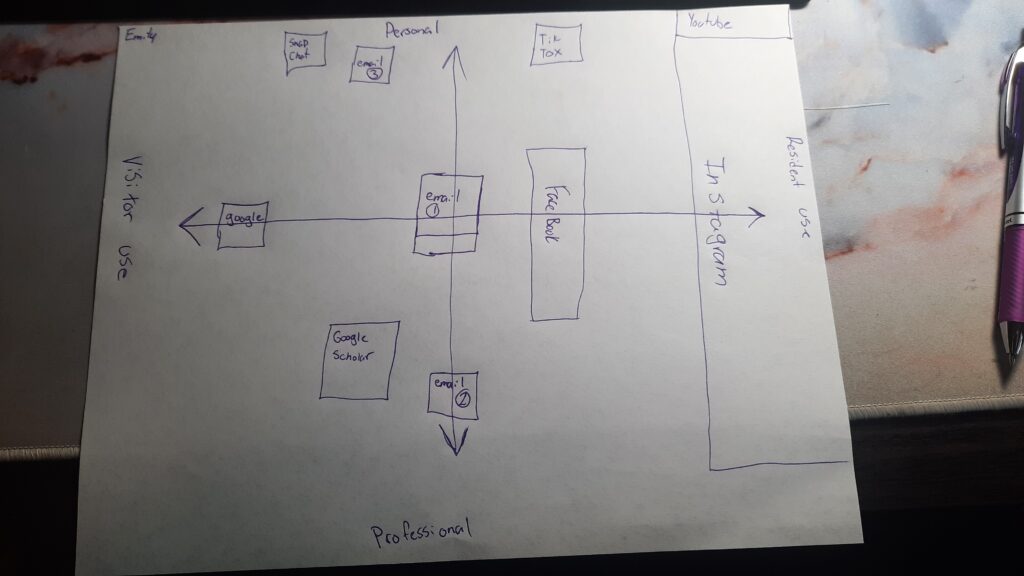
Wikipedia Edit: K’omoks Language
https://en.wikipedia.org/wiki/K%27%C3%B3moks#Language
Twitter Chat:


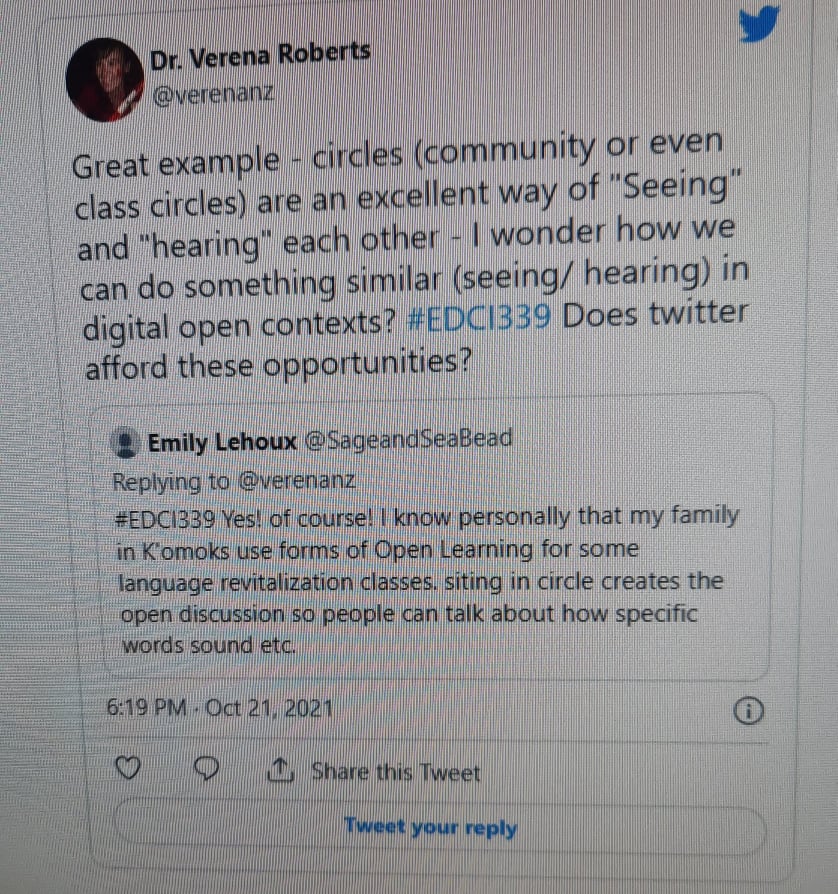

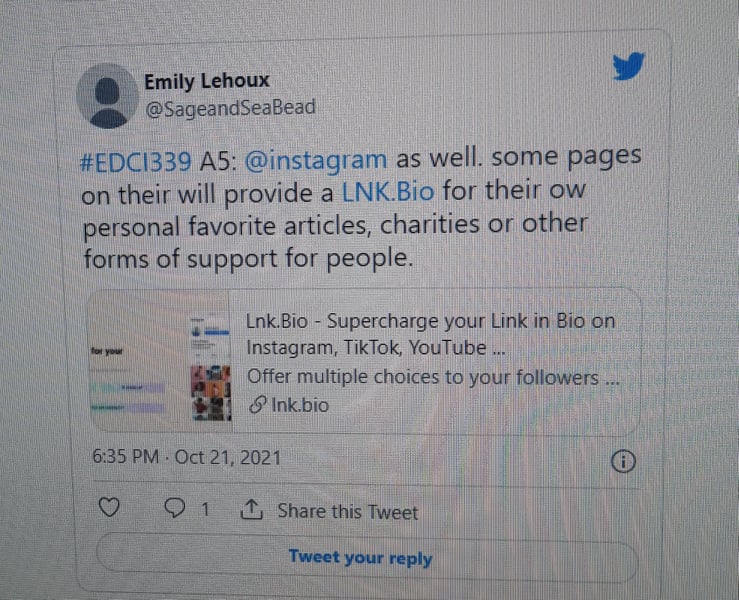
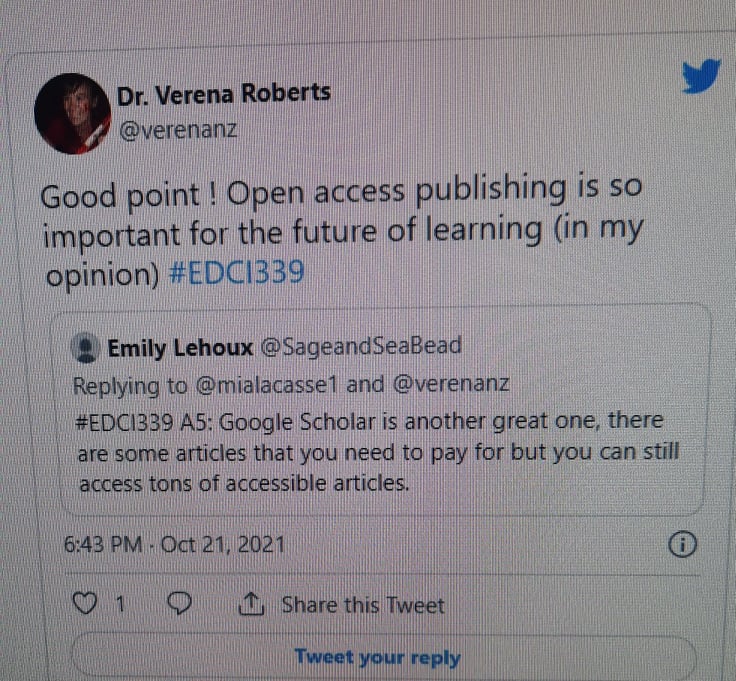

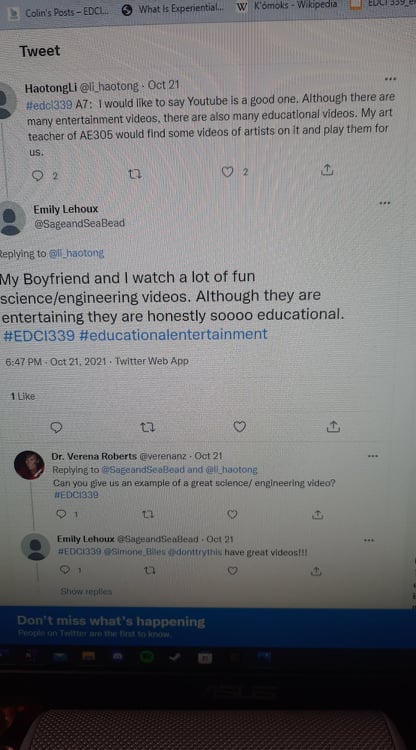

Evidence of Group Participation (Pardon the few Explicit words):









